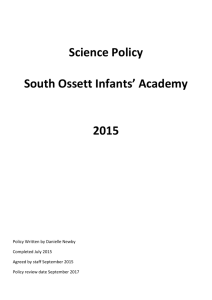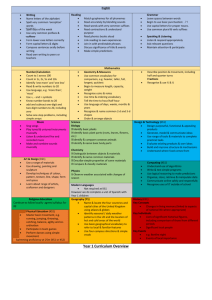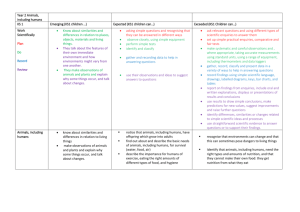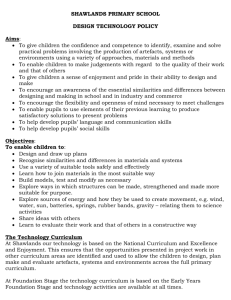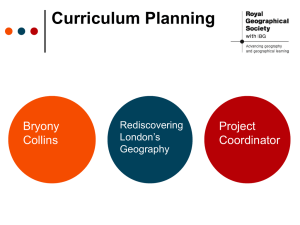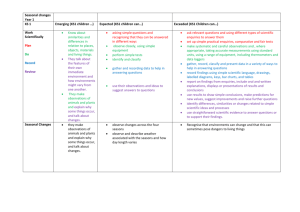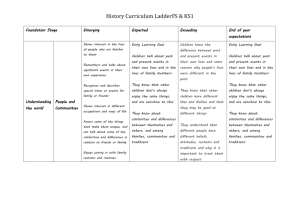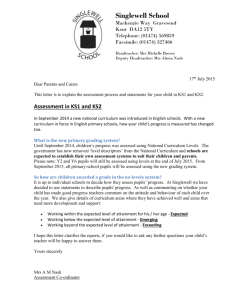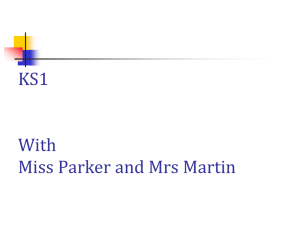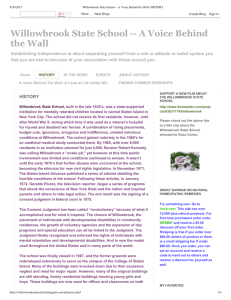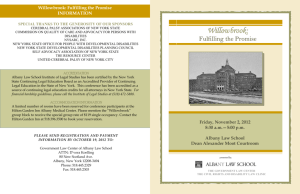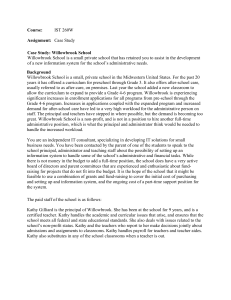Curriculum 2014 - Willowbrook Primary School
advertisement
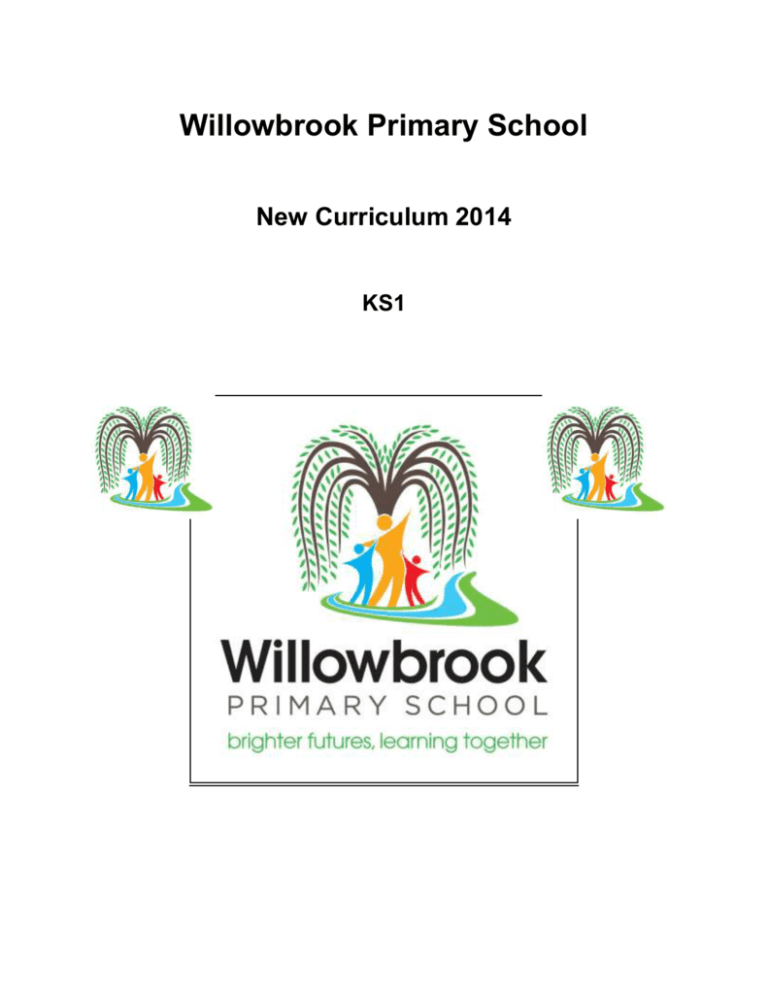
Willowbrook Primary School New Curriculum 2014 KS1 Willowbrook Primary School Topic Long Term Plan KEY STAGE 1 1 1 1 1 2 2 2 2 3 3 3 3 4 4 4 4 5 5 5 5 6 6 6 6 All Creatures Great and Small (Env) (P – safety) Wonderful Willowbrook (C) Treasure (P) Seaside Rescue (Env) Mega Structures (Env) – Effect on env / Eco houses (C) Struct in our city Movers and Shakers (E) (Business) World Kitchen (E) (Food) Dungeons and Dragons (P) Earth, Wind and Fire (Env) – wind tur Awesome Ancients (P) Savage Stone Age (E) Team work – Come up with a way to get Wales to Stone Henge What puts the Great in Britain? (C) (P) Rotten Romans (C) (E) – Success of empire Exploring Europe (P) – Different cultures What’s on our doorstep? (E) Tourism Raging Rivers (Env) Buried Treasure (E) Trade links Amazing Americas (Env) Compare N and S America industrialisation Groovy Greeks (C) Theatre, Formation of a new culture… Performance to local community group. Does money make the world go round? (P) / (E) Is it right to fight? (P) One Leicester, One World (C) Mighty Myans (E) SATS AND PERFORMANCE All topics must use the school drivers – Community (C) Enterprise (E) Environment (Env) PSHCE (P) The also need to have – A link to our UNICEF Rights Respecting School Award At least one G&T activity At least one trip or some form of enrichment Subjects to be included – Art and Design Design and Technology Geography History Computing (Microsoft Office and similar software) Cross Curricular Literacy Activity Cross Curricular Numeracy Activity Subjects that don’t need to be included (but could be if appropriate!) – Computing (See curriculum subject content) Music PE Languages No No No No No No No No No YES YES YES YES YES YES No No YES No YES No No YES No KS1 Computing KS 1 Pupils should be taught to: understand what algorithms are; how they are implemented as programs on digital devices; and that programs execute by following precise and unambiguous instructions create and debug simple programs use logical reasoning to predict the behaviour of simple programs use technology purposefully to create, organise, store, manipulate and retrieve digital content recognise common uses of information technology beyond school use technology safely and respectfully, keeping personal information private; identify where to go for help and support when they have concerns about content or contact on the internet or other online technologies. Use Microsoft Office and similar software to create things such as PowerPoint presentations, word processed work, excel spreadsheets and Photo Stories KS1 Art KS 1 Pupils should be taught: To use a range of materials creatively to design and make products To use drawing, painting and sculpture to develop and share their ideas, experiences and imagination To develop a wide range of art and design techniques in using colour, pattern, texture, line, shape, form and space About the work of a range of artists, craft makers and designers, describing the differences and similarities between different practices and disciplines, and making links to their own work. To create sketch books to record their observations and use them to review and revisit ideas The art coordinator will check evidence in sketch books twice a year. Suggested Artists Year Group 1 1 Topic All Creatures great & Small Seaside Rescue Artist David Shepherd Paul Klee 2 World Kitchen Giuseppe Arcrimboldo 2 Movers & Shakers Vincent Van Gogh KS1 Design and Technology Through a variety of creative and practical activities, pupils should be taught the knowledge, understanding and skills needed to engage in an iterative process of designing and making. They should work in a range of relevant contexts [for example, the home and school, gardens and playgrounds, the local community, industry and the wider environment]. Cooking and nutrition As part of their work with food, pupils should be taught how to cook and apply the principles of nutrition and healthy eating. Instilling a love of cooking in pupils will also open a door to one of the great expressions of human creativity. Learning how to cook is a crucial life skill that enables pupils to feed themselves and others affordably and well, now and in later life. KS1 Design design purposeful, functional, appealing products for themselves and other users based on design criteria generate, develop, model and communicate their ideas through talking, drawing, templates, mock-ups and, where appropriate, information and communication technology Make select from and use a range of tools and equipment to perform practical tasks [for example, cutting, shaping, joining and finishing] select from and use a wide range of materials and components, including construction materials, textiles and ingredients, according to their characteristics Evaluate explore and evaluate a range of existing products evaluate their ideas and products against design criteria Technical knowledge build structures, exploring how they can be made stronger, stiffer and more stable Key stage 1 - Cooking use the basic principles of a healthy and varied diet to prepare dishes understand where food comes from. KS1 History Year 1 Suggested topic -significant historical events, people and places in their own locality Wonderful Willowbrook Buried treasure -changes within living memory. Where appropriate, these should be used to reveal aspects of change in national life Seaside Rescue Year 2 Suggested topic -the lives of significant individuals in the past who have contributed to national and international achievements. Some should be used to compare aspects of life in different periods [for example, Elizabeth I and Queen Victoria, Christopher Columbus and Neil Armstrong, William Caxton and Tim Berners-Lee, Pieter Bruegel the Elder and LS Lowry, Rosa Parks and Emily Davison, Mary Seacole and/or Florence Nightingale and Edith Cavell Movers and Shakers -events beyond living memory that are significant nationally or globally [for example, the Great Fire of London, the first aeroplane flight or events commemorated through festivals or anniversaries Dungeons and Dragons KS1 Geography Year 1 Place knowledge Suggested Topic understand geographical similarities and differences through studying the human and physical geography of a small area of the United Kingdom, and of a small area in a contrasting nonEuropean country End of year teacher topic Human and Physical Geography use basic geographical vocabulary to refer to: key physical features, including: beach, cliff, coast, forest, hill, mountain, sea, ocean, river, soil, valley, vegetation, season and weather Seaside Rescue key human features, including: city, town, village, factory, farm, house, office, port, harbour and shop Wonderful Willowbrook Geographical skills and fieldwork use world maps, atlases and globes to identify the United Kingdom and its countries, as well as the countries, continents and oceans studied at this key stage All topics use simple compass directions (North, South, East and West) and locational and directional language [for example, near and far; left and right], to describe the location of features and routes on a map use simple fieldwork and observational skills to study the geography of their school and its grounds and the key human and physical features of its surrounding environment. Wonderful Willowbrook Wonderful Willowbrook Year 2 Suggested Topic Locational Knowledge name and locate the world’s seven continents and five oceans Megastructures World Kitchen name, locate and identify characteristics of the four countries and capital cities of the United Kingdom and its surrounding seas Megastructures World Kitchen Place knowledge understand geographical similarities and differences through studying the human and physical geography of a small area of the United Kingdom, and of a small area in a contrasting nonEuropean country End of year teacher topic Human and Physical Geography identify seasonal and daily weather patterns in the United Kingdom and the location of hot and cold areas of the world in relation to the Equator and the North and South Poles Geographical skills and fieldwork World Kitchen use world maps, atlases and globes to identify the United Kingdom and its countries, as well as the countries, continents and oceans studied at this key stage All topics use aerial photographs and plan perspectives to recognise landmarks and basic human and physical features; devise a simple map; and use and construct basic symbols in a key KS1 PE Year 1 Dance – Autumn 1 Perform dances using simple movement patterns Gymnastics – Autumn 2 Balance, agility and co-ordination, and begin to apply these in a range of activities Team Games – Spring 1 & 2 Participate in team games Developing simple tactics for attacking and defending Athletics – Summer 1 & 2 Master & develop basic movements – running Master & develop basic movements – jumping Master & develop basic movements – throwing Master & develop basic movements – catching Year 2 Gymnastics – Autumn 1 Balance, agility and co-ordination, and begin to apply these in a range of activities Dance – Autumn 2 Perform dances using simple movement patterns Team Games – Spring 1 & 2 Participate in team games Developing simple tactics for attacking and defending Athletics – Summer 1 & 2 Master & develop basic movements – running Master & develop basic movements – jumping Master & develop basic movements – throwing Master & develop basic movements – catching Dungeons & Dragons KS1 Music KS1 Use their voices expressively and creatively by singing songs and speaking chants and rhymes Play tuned and untuned instruments musically Listen with concentration and understanding to a range of high-quality live and recorded music Experiment with, create, select and combine sounds using the inter-related dimensions of music
